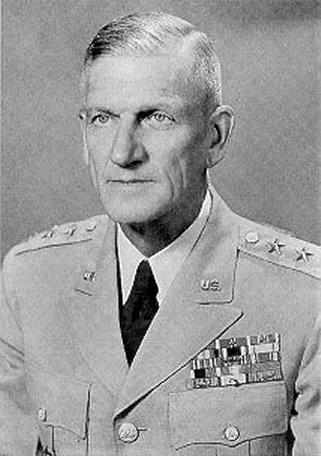Robert
Miller Montague (August 7, 1899 – February 20, 1958)
was a Lieutenant General in the United States Army. He
achieved prominence as the deputy commander of Fort Bliss,
Texas and commander of the Sandia Missile Base in New
Mexico during the start of modern ufology and head of
the U.S. Caribbean Command.

Montague
as commander of the Sandia Missile Base
Early
life
Montague
was born in Portland, Oregon on August 7, 1899. He attended
the University of Oregon and then transferred to the United
States Military Academy, from which he graduated in 1918
with a commission as a second lieutenant of Artillery.
World
War I
Having
graduated in November during a wartime expansion of the
West Point student body, Montague began his career too
late for active combat in World War I. As many other students
from his class did, Montague carried out a European observation
tour for most of 1919, enhancing his professional knowledge
by visiting battlefields in France, Belgium, and Germany,
compiling after action reports, and interviewing battlefield
veterans.
Post
World War I
Montague
completed the Field Artillery Basic Course in 1920.
He
then carried out numerous assignments throughout the United
States, including serving as an instructor at the United
States Military Academy in the 1930s.
In
1933, Montague graduated from the Field Artillery Advanced
Course.
Montague
completed the Command and General Staff College in 1938.
World
War II
From
1944 to 1945, Montague was commander of the 83rd Infantry
Division Artillery in the European Theater of Operations.
He also served as acting division commander on several
occasions.
Post
World War II
From
1945 to 1947, Montague served as deputy commander of the
Army’s Air Defense Artillery Center at Fort Bliss,
Texas.
From
1947 to 1951, Montague was the commander of the Sandia
Missile Base near Albuquerque, New Mexico.
Montague
served as the head of plans, operations and training,
G-3, for the United States European Command from 1951
to 1952.
From
1952 to 1955, Montague was assigned as deputy commander
of Army Field Forces, based at Fort Monroe, Virginia.
Montague
commanded the U.S. I Corps in South Korea from 1955 to
1957.
Connection
to UFO studies
As
deputy commander of Fort Bliss with supposed jurisdiction
over the White Sands Missile Range at the time of the
Roswell Incident, and later as commander of the Sandia
Base, Montague is presumed by many UFO researchers to
have been made aware of an alleged spacecraft crash near
Roswell, New Mexico or to have had a hand in covering
up evidence of the alleged crash, and his name routinely
appears in UFO magazines, books and other media.
Commander,
U.S. Caribbean Command
In
1957, Montague was appointed to command the U.S. Caribbean
Defense Command, the post he was still serving in when
he died.
Death
General
Montague was stricken with an intestinal illness in January,
1958 after traveling extensively in South America. He
did not recover, and died on February 20 from a cerebral
hemorrhage at Gorgas Hospital, Balboa, Panama Canal Zone.
Robert
M. Montague is buried at Arlington National Cemetery,
Section 30, Site 533 RH.
Awards
and decorations
General
Montague received the Distinguished Service Medal, the
Legion of Merit and two awards of the Bronze Star.
Memorials
Montague
Road at Fort Sill is named for him as is Montague Loop
at Fort Bliss.
Personal
Robert
Miller Montague was the father of Brigadier General Robert
M. Montague, Jr., (October 22, 1924 – October 15,
1996), who graduated from West Point in 1947 and was one
of the early U.S. strategists of the Vietnam War. After
retiring from the Army, the younger Montague served as
executive director of the Joseph P. Kennedy, Jr. Foundation
and the Special Olympics.
Source:
http://en.wikipedia.org/wiki/Robert_Miller_Montague
